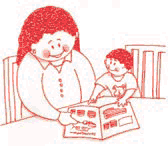|
Rhyme It!
Rhyming helps children start to pay attention to the sounds in words, which is an important first step in learning to read.
What You Need
- Books with rhyming words, word games or songs
What to Do
- Play rhyming games and sing rhyming songs with your child. Many songs and games include clapping and bouncing and tossing balls.
- Read nursery rhymes to your child. As you read, stop before a rhyming word and encourage her to fill in the blank. When she does, praise her.
- Listen for rhymes in songs that you know or hear on the radio, TV or at family or other gatherings. Sing the songs with your child.
- Around the home, point to objects and say their names, for example, sink. Then ask your child to say as many words as he can that rhyme with the name. Other good easily rhymed words are ball, bread, rug, clock and bread. Let him use some silly or nonsense words as well: ball-tall, call, small, dall, jall, nall.
- Say three words such as cat, dog and sat and ask your child which words sound the same-rhyme.
- If your child has an easy-to-rhyme name, ask her to say words that rhyme with it: Kate-plate, late, wait, date, gate.
- If a computer is available, encourage your child to download and run rhyming games.
Rhymes are an extension of children's language skills. By hearing and saying rhymes, along with repeated words and phrases, your child learns about spoken sounds and about words. Rhymes also spark a child's excitement about what comes next, which adds fun and adventure to reading. |
Say the Sound
Listening for and saying sounds in words helps children learn that spoken words are made up of sounds, which gets them ready to match spoken sounds to written letters. This, in turn, gets them ready to read.
What You Need

- Book of nursery or nonsense rhymes
- Old children's magazine
What to Do
- Say four words that begin with the same sound, such as big, ball, basket and balloon. Ask your child to tell you the first sound in each word, /b/*.
- Say four words, such as cap, hop, cake and camera. Ask your child which of the words starts with a different sound.
- Say four words, such as stop, top, mop and hop. Ask your child to tell you what the last sound is in each word, /p/.
- Give your child an old magazine. Sit with him and point out objects in the pictures. Ask him to say the sounds that the objects start with.
Change the game by saying a sound and having him find an object in a picture that starts with that sound.
- Have fun by helping your child say tongue twisters such as "Peter Piper picked a peck of pickled peppers," and nonsense rhymes such as "Hey Diddle, Diddle," as well as more modern nonsense rhymes such as those of Dr. Seuss.
- As you read a story or poem, ask your child to listen for and say the words that begin with the same sound. Then have her think of and say another word that begins with the sound.
- Help your child to make up and say silly sentences with lots of words that start with the same sound, such as, "Tom took ten toy trucks to town."
Helping your child learn to pay attention to sounds in words can prevent reading problems later on. |
Learning Activities for Children:
|
|
|